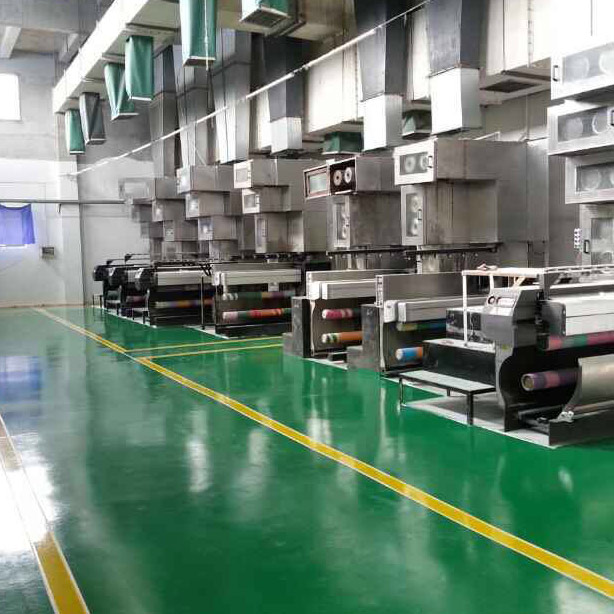- Polypropylene spinning machine
- Polypropylene FDY equipment
- Polyester POY spinning machine
- Polyamide FDY common and high strength equipment
- Polyester FDY equipment
- Polyester high strength equipment
- polyester、Polyamide、 Polypropylene BCF equipment
- Small spinning machine
- All kinds of spinning special parts
- A Guide for Managers to Break Through: Empowerment Rather than Control: Helping Enterprises Bid farewell to Internal Friction and Activate the Intrinsic Motivation of Teams!
- The 2025 Textile and Garment Innovation Annual Conference and the Gongqingcheng Down Industry Development Conference came to a successful conclusion
- The technological upgrade of polypropylene FDY spinning machines empowers the production of diversified chemical fibers
- Textile News: Full-chain Efforts + Cross-border Breakthroughs + Talent Foundation - The Textile Industry is set to Experience a Development Trio!
- The 2025 China Home Textile Fashion Innovation Conference grandly kicked off in Binzhou
- On the Important Role of Polypropylene Spinning Machines in Chemical Fiber Production

- Contact:Mr. Huang Guofu
- Cel:0086-13901505556
- Fax:0086-519-83341119
- Email:czfb5556@126.com
- Add:No. 288-8 ChangLi Rd, Huangli Town, Changzhou, JS PRV.
How many people face it calmly when they are accused? I may not say it, but I don't like it. "Emotion is instinct. Controlling emotion is skill." Emotion is a subconscious behavior that occurs unconsciously when encountering something.
01, how to avoid emotional
As a workplace person, you will also be controlled by emotions, and the "interference" from the outside world will lead to your subconscious being trapped in the "emotional cage". Being emotional can have a negative impact on individuals and teams, such as reducing productivity, damaging relationships, and affecting the quality of decision making. How to avoid being emotional in the workplace, Xiaobian sorted out these suggestions for you:
Self-awareness and emotion recognition
Recognize that you will sometimes react emotionally. It is normal to accept these emotions, but the key is how to manage and control them. By identifying the source of emotions, rational analysis can be better performed, rather than being dominated by emotions.
Take deep breaths and think calmly
When feeling emotional, try breathing deeply, meditating, or briefly leaving the scene to calm down. You can set some self-reminders, such as "think calmly before responding."
Develop a positive attitude
Try to look at the problem in a positive light and look for solutions instead of dwelling on the problem. Share positive energy with colleagues to create a positive work atmosphere. When faced with a challenge, try to find the positive side of the situation, which will not only reduce stress, but also keep you optimistic and make better decisions.
Learn to listen and communicate
Learn to listen and understand others to avoid misunderstandings and conflicts. Try to remain calm and polite when expressing your opinions and feelings in communication.
Maintain a healthy lifestyle
Adequate sleep, a balanced diet and moderate exercise help maintain a stable emotional state. Avoid over-reliance on stimulants such as caffeine and alcohol.
Set reasonable expectations
Unrealistic expectations often lead to frustration and dissatisfaction. Review your emotional responses regularly, identify what triggers them, and think about how you can improve. Summarize effective emotion management strategies and apply them in future work. Set reasonable goals for yourself, accept difficulties and imperfections at work, and reduce mood swings.
In short, avoiding workplace emotions requires employees to have self-cognition, self-regulation, active communication, reasonable expectations, healthy lifestyle and other aspects of the ability. Through continuous learning and practice, workers can gradually master these skills, so as to stay calm and rational in the workplace.
02, the way to survive in the workplace
1, If you can, please express your attitude and principles with real actions, not just words. After all, there seems to be no point in provoking or offending people with words other than to cause trouble. We often say, do not say tough things, do not do soft things, in fact, is this truth and logic.
2, on the issue of development and progress, background and connections are indeed faster. This is an undeniable fact, after all, there are resources to pave the way, there are superior guidance, whether it is to seek people or plans, will get twice the result with half the effort, fast horse. But don't equate background and relationships with everything, personal effort and life opportunities are also important.
3, do not casually and colleagues heart to heart, not to think that colleagues will become true friends. Colleagues can become friends, but most of these relationships are prone to change, especially when there is a conflict of interest. Therefore, it is better to maintain the necessary distance, after all, the work relationship is the essence of the relationship between colleagues.
4, do not try to make friends with leaders, leaders are leaders, can not be friends. Your essential relationship is the relationship between superiors and subordinates, unless your comprehensive strength and energy have been equal to the leader and have the chips to sit on an equal footing with him. Even if the leader and you are friends, you should also deeply realize that the leader just wants you to work more.
5, when the work of controllable mistakes, if the subordinate attitude is very correct, can take the initiative to admit the fault, then do not scold him, because he has recognized the mistake. If we resort to blame at this time, it may backfire. When leaders criticize subordinates, they should pay attention to the art of management, and they should correct their mistakes and work hard.
03, the ability of the workplace how to stand out
In the competitive workplace, how to stand out and become an indispensable talent in the enterprise? The answer is very simple, that is, constantly improve their work ability, build personal hard power. Here are some key elements and strategies that can help you continuously improve your professional skills and overall qualities in order to become a competent professional:
Define career goals
Set clear career goals: Understand your interests, strengths and long-term career plans, and set clear and achievable short - and long-term career goals. Continuous learning and improvement: Develop learning plans according to career goals, constantly learn new knowledge and skills, and maintain competitiveness.
Upgrade professional skills
Master your job: Have a deep understanding of your industry, company and position to become an expert in your field. Learn new technologies and tools: Follow industry trends, learn the latest technologies, methods and tools to improve work efficiency and quality.
Enhance soft skills
Communication and collaboration skills: Learn to listen, express, negotiate and cooperate, and build good relationships with colleagues, superiors and customers. Leadership and team management ability: Develop my own leadership, learn to lead the team, assign tasks, motivate members, and improve the overall performance of the team. Problem solving and decision-making skills: Develop logical and critical thinking, learn to analyze problems, develop solutions and make informed decisions.
Develop a good work attitude
Proactive: Be enthusiastic about the work, take the initiative to take responsibility, look for opportunities, and constantly improve themselves. Responsibility and professionalism: responsible for their own work, due diligence, the pursuit of excellence, to create value for the company. Adaptability and flexibility: Adapt to changes in company culture and work environment, flexibly respond to challenges and opportunities.
Stay mentally healthy
Stress management: Learn to recognize and manage work stress and maintain a positive attitude and emotional stability. Work-life balance: Manage your time wisely, maintain a work-life balance, and ensure that you have enough time for rest and recreation. Seek support: Maintain good relationships with family, friends, and colleagues and seek their support and help in facing workplace challenges together.
Bottom line: By constantly learning and practicing these strategies, you will gradually become a competent professional. Remember that success takes time and effort, keep patience and perseverance, and believe in your ability to make continuous progress and achievements.
The content and template of this article are organized from the network copyright of the original author. If there is infringement, please inform in time and contact to delete.
- A Guide for Managers to Break Through: Empowerment Rather than Control: Helping Enterprise
- The 2025 Textile and Garment Innovation Annual Conference and the Gongqingcheng Down Indus
- The technological upgrade of polypropylene FDY spinning machines empowers the production o
- Textile News: Full-chain Efforts + Cross-border Breakthroughs + Talent Foundation - The Te
- The 2025 China Home Textile Fashion Innovation Conference grandly kicked off in Binzhou
- On the Important Role of Polypropylene Spinning Machines in Chemical Fiber Production
- Management Skills: Managing Problems = Managing Efficiency: Anchor the essence of manageme
- Shandong is promoting the transformation and upgrading of its textile industry through int
- Guide to Parameters of Polypropylene Spinning Machine Equipment
- The second Smart Fiber and Flexible Wearable Technology Exchange Conference was held in Na




